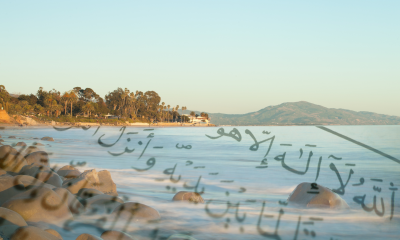-
Keep Good Relations with Your Teachers
They’re the source of knowledge, and regardless of how good or ineffective they may be—Allah tells us to be kind, gentle and appreciative of them. The story of Musa  and Khidr
and Khidr  in Surah Kahf is nothing but the story of a student and a teacher.
in Surah Kahf is nothing but the story of a student and a teacher.

Musa asks his teacher Khidr, “Can I follow you to learn from what you’ve been taught?” (18:66)
Keep supporting MuslimMatters for the sake of Allah
Alhamdulillah, we're at over 850 supporters. Help us get to 900 supporters this month. All it takes is a small gift from a reader like you to keep us going, for just $2 / month.
The Prophet (SAW) has taught us the best of deeds are those that done consistently, even if they are small.
Click here to support MuslimMatters with a monthly donation of $2 per month. Set it and collect blessings from Allah (swt) for the khayr you're supporting without thinking about it.
Pro Tip: We learn humility, patience, and respect from the Qur’an for our teachers. Of course, this comes in particularly beneficial when negotiating marks and receiving recommendations.
-
Get Help, Study Together
Allah tells us in the Qur’an to get extra help from our teachers, TAs, RAs, or anyone else:

And ask the people who remember, if you do not know yourself (16:43)
Pro Tip: To really test the depth of your knowledge, ask deeper questions. ‘Rattle the cages’ of assumptions, test the limits of theories and contemplate on alternative approaches.
-
Help Others
Now if you don’t need to ask others for help, know that you should help out others. A fundamental goal of Islam and Muslims is service. Help others and make the world a better place.

And Allah will help those who help Him. Indeed, Allah is Powerful and Exalted in Might. (22:40)
Pro Tip: If you’re intention is to help others for the sake of Allah, as part of being a good Muslim and for the sake of Islam—then Allah will help you out. (Now don’t be helping a sister at 10pm alone on campus, just to show how righteous Muslims really are!)
-
Eliminate Your Ego and Arrogance
Allah teaches us intellectual humility:

Above every knowledgeable person, is someone with more knowledge. (12:76)
Your mind, your memory, your marks, your GPA, your whatever—it’s all from Allah. Just as you didn’t choose to be born with a nose on your face and not on your toes, you didn’t select your inborn talents.

Is not hell the [proper] abode for all who [thus] deny the truth (29:68)
Pro Tip: Know your place and don’t get arrogant with what you know.
-
Complain to Allah
When he lost two of his beloved sons, Yaqub  said,
said,

He said I only complain, cry, beg and plea to Allah about my circumstance (12:86)
Let this exam period be a chance for you to cry before Allah, talk to him and complain to him about your worries and fears—don’t complain in front of others. Sometimes Allah sends things in your life, only so you can turn back towards Allah. He misses your voice and wants you to call Him in times of difficulty and happiness.
Pro Tip: Complain to Allah, not to others.
-
Trust in Allah
Yunus  was swallowed up by a whale. In the darkness of the night, in the depths of the ocean, deep in the belly of a whale—there was no foreseeable exit. With an imminent yet excruciatingly painful death ahead, Yunus
was swallowed up by a whale. In the darkness of the night, in the depths of the ocean, deep in the belly of a whale—there was no foreseeable exit. With an imminent yet excruciatingly painful death ahead, Yunus  at that moment reminded himself of his weakness. His incapacity and powerlessness to redefine the situation. He realized his helplessness to Allah and at that moment, cried out:
at that moment reminded himself of his weakness. His incapacity and powerlessness to redefine the situation. He realized his helplessness to Allah and at that moment, cried out:

There is no God but Allah, how perfect is He, I’m definitely among the wrongdoers. (21:87)
Immediately thereafter, Allah responded and saved his troubled slave from an impossible situation.
Allah teaches us that just as he helped Yunus  out of an impossibly difficult circumstance, likewise He can make a way out for us.
out of an impossibly difficult circumstance, likewise He can make a way out for us.
Allah tells Musa  :
:

Allah said: Don’t fear, you are victorious. (20:68)
Just as Allah told Musa  to let go of his human emotion of fear, and trust in Allah when facing a tyrant and his magicians; likewise, remember that Allah is telling us to leave our fears aside, accept our helplessness and surrender our frailty to the limitlessness of Allah.
to let go of his human emotion of fear, and trust in Allah when facing a tyrant and his magicians; likewise, remember that Allah is telling us to leave our fears aside, accept our helplessness and surrender our frailty to the limitlessness of Allah.
Pro Tip: Study hard and then trust in Allah to help you through it.
-
Put Things in Perspective

And the life of the world is nothing but a temporary deception. (3:185)
Allah puts our exams into perspective: it’s nothing but a temporary deception. In the long run, it probably won’t matter as much as it does right now. So take it with a grain of salt and trust Allah, it’ll be okay. Inshā’Allāh. Be patient. Breathe.

And what is to come later, is better than what came before.” (93:4)
This verse can be translated to reflect several layers of meaning. I articulated it relevant to this context as the verse is capacious to such an application.
Pro Tip: Maintain your perspective. Realize your exams aren’t the end of the world.
-
Accept Qadar

Allah extends rizq (rizq could include provisions like wealth, jobs, and by extension even marks) to whoever he wants; and He gives in perfect, calculated measure (limiting it to others that He chooses). (13:26)
Sometimes if it’s not meant to be, it’s not meant to be. Islam is beautiful and perfect, the education system is not. Allah is so merciful He knows the outcomes are beyond our control, that’s why you’re only judged based on your efforts and your intentions.
Pro Tip: Don’t be harsh on yourself. Do your best and leave the rest to Allah. And always say Alḥamdulilāh.
-
Make Du‘ā’
We’re all just travelers on a long and painful journey as students, who can help us except for Allah?

So who else besides Allah, can help the one in difficulty, and alleviate from him the pain, suffering and harm? (27:62)
Du‘ā’ is an experience when a slave recognizes his helplessness, his inability, his powerless and his desperate need for the one who is limitless, Allah.
I end off with the du‘ā’ of Zakariya  , a du‘ā’ of impossibility and faith, of patience and trust, of hope and positive expectations,
, a du‘ā’ of impossibility and faith, of patience and trust, of hope and positive expectations,

And I will never, in prayer to you my Beloved Lord, lose hope.” (19:4)
Pro-Tip: A measure of your relationship to Allah is your du‘ā’. A lover never gets tired of conversing with their beloved, so ask yourself how often and for how long do you make du‘ā’? Set aside quality time daily for du’a.
A concluding lesson about Qur’an: It’s relevant. It’s our guide. It’s our buddy, our friend that never leaves us. It’s there for us, but the question is are we there by it?
I encourage everyone to not lose hope. Trust in Allah, and be patient. As Allah says, “Fathkuroonee, athkurkum, washkuroo lee walaa takfuroon”—“remember me, Allah, and I’ll remember you. Be grateful to me and don’t disbelieve, don’t be ungrateful.”
If you benefitted even a bit, don’t forget this little brother of yours in your du’a. Jazakallah Khayr.
[1] Al Itqqaaan Fil Uloomil Quran, Imam Suyuti
[2] Lowering the Gaze, ‘al-Muntaqâ min Ighâthatul Lufhân fî Masâyid ash-Shaytân’ [pp.’s 102-105], of Ibn al-Qayyim, summarised by ‘Alî Hasan al-Halabi (find the pdf online, it’s in English and its awesome motivation to lower our gaze).


 #Life1 month ago
#Life1 month ago
 #Current Affairs1 month ago
#Current Affairs1 month ago
 #Islam2 weeks ago
#Islam2 weeks ago
 #Current Affairs4 weeks ago
#Current Affairs4 weeks ago
 and Khidr
and Khidr 











Jamiu
December 18, 2014 at 3:32 PM
Dear Author, There was a mix up about Quran 6 vs 162 quoted above, by giving the meaning and interpretation of Q. 6 VS 161 in place of Q. 6 VS 162. Please, recheck and correct. Jazak’Allahu khaeran for propagating and enlighten the Ummah through this medium.
Farnaz Mawla
December 18, 2014 at 8:58 PM
Corrected – Jzk!
Hassan
December 18, 2014 at 8:15 PM
Masha Allah! What a beautiful and beneficial article, brother! Jazakallhu Khayr!
Tadar Wazir
December 18, 2014 at 11:28 PM
As-Salaam-u alaikum, May Allah reward you greatly for your efforts in trying to get us to READ in the name of our LORD Who created…; Ar-Rahman – The Merciful Benefactor; allam al-Qur’an – has taught (and is teaching) The Qur’an; khalaqa al-insaan – (by it) He has created humanity; allmahu-l bayaan – (by so doing) He has imparted (and is imparting) unto humanity articulate thought and speech .
There is a mix up in your translation of 21:87. In the Arabiya it is spoken in the 2nd person; one person speaking with another. The Prophet Yunus (a.) speaking directly to Allah (h.) Your translation is in the 3rd person; one person speaking about another. In that case the Prophet Yunus (a.) would be telling at least one more person about Allah.
Please correct it? And keep on keeping on.
As-Salaam-u alaikum.
asharib
December 24, 2014 at 11:01 PM
Walikum salaam warahmatullahi wabarakatuh, Jazakallah khayr for your message Tadar. That’s an interesting point, I absolutely agree that dua is a conversation and therefore between the speaker who asks (us) and the listener who answers/responds (Allah). So better translation than the one I used above should have “…no God but YOU” with the current placement of the word Allah maybe in brackets. I totally agree with you, if I understood you correctly.
Umm Hanaa
December 19, 2014 at 5:16 AM
Masha Allah! May Allah bless you and increase you in ilm for this beneficial article..keep up the good work lil bro.
Hibaysh
December 20, 2014 at 11:45 AM
Assalamu’alikum brother,
Very beneficial Alhamdulillah. JazakAllahu Khair!
M. Mahmud
December 21, 2014 at 9:03 PM
Wonderful article…..I will probably re-read it.
One small thing:
(In fact the word Insaan meaning “mankind,” is a hyperbolized form of ‘someone that forgets’ a lot)
Does it not mean/translate to the man instead of mankind?
asharib
December 24, 2014 at 10:55 PM
Jazakallah khayr for your comment, insaan is used for mankind as a whole in the Qur’an (as best to what I learned, wallahu alim). Man + Woman. It should be on the form “فعلان” which is one of the most exaggerated/hyperbolized forms. On a side note, I recommend listening to Ustadh Norman’s 30th juz tafseer if you haven’t already, it’s mind blowing :)
asharib
December 24, 2014 at 11:09 PM
My apologies brother, I think I may have misunderstood your concern in the above reply! Ignore it! Yes you’re absolutely spot on brother. The translation is mankind. Sometimes going into the language and its literal roots could give depths of meaningful insight.
Aisha
December 23, 2014 at 8:52 PM
JazakAllah khair for this post! it is really beneficial since i’m a college student!!
Pingback: 22 STUDY SKILLS FROM THE QURAN | PASS THE KNOWLEDGE (LIGHT & LIFE)
saidat akanbi
December 31, 2014 at 6:22 PM
i have been blessed by reading this. may Allah bless you!
Omar Sawo
January 7, 2015 at 6:20 AM
Alhamdulillah!,may Allah help us to be prosperous in life and to be dwellers of Janna,Paradise.Ameen!
Aisha
January 18, 2015 at 12:10 PM
Jazak’ Allah Khaeer for this wonderful article. Benefited from this so much Allhamdulillah. If we have this kind of attitude in everything that we do or intent to do then In Shaa Allah, Allah Almighty will add Barakah in our work..
mebruka Abdurahman
May 6, 2015 at 12:02 PM
I really enjoyed reading this article. JZK, for this amazing and helpful advice. It was the best 22 study skills i have ever read in my life, mainly because it was from the quran. I pray to Allah that he strengths you to attain his pleasure and grant you Firdose.
atiya
August 2, 2016 at 2:43 AM
wow…… i was so demoralised and finding no reason why I am studying. …. but this article give me dedication, hope, and purpose of my life. …. surely I will be reading it in my hard times again..
Mohammad
September 2, 2016 at 11:42 AM
May Allah bless u good article
i was thinking when we mention the name of RasoolAllah peace be upon him we should add Rasool or Nabi out of respect as well no? may Allah bless you good article
RB
November 5, 2016 at 2:27 PM
Assalamualaykum warahmatullahhi wabarakatuhu, Thank you so much for this article.
May Allah bless all of us.
Afra Asad
November 17, 2016 at 1:00 AM
Masha Allah this is the best inspiring article I’ve ever read.
Jazakallahu khairto the Author
Pingback: 22 Study Skills From The QURAN – allahouronlyhope
Halla
December 20, 2016 at 6:49 AM
Masha Allah. I really like this article.
This article boosted up my motivation and
beliefs in Allah.
Thank you!
saba mariam yasir
January 1, 2017 at 5:04 AM
allahu akbar!!
what a beautiful article it is …right now i am so relieved by reading this article……..i was so much in tension that my exams are approaching and that its one of the biggest fight of my life and that i havent prepared a bit since the past 10 months .
allhamdullillah i found this article and i have full faith in allah that he will give me the best.
remember me in your duas……jazakallah khair.
Da Fityah
March 20, 2017 at 2:43 AM
Assalam. Thank you very much for your sharing. Students must know this. May Allah bless you.
Tuğba
April 3, 2017 at 2:35 PM
Assalamun Alaikum , while i was searching to find how islamic scholars studied , the way of their lives i came across with this great article . Thank you so much for this .
I will be glad if anyone can suggest me a resource where i can learn how they studied ..
Yassine L
September 2, 2017 at 8:06 AM
Jazakuallah khayaran dear brother ! Very inspiring
Ali Anzer
February 7, 2018 at 5:48 AM
Jzk Allah. So beneficial as i was about to start my University and still didn’t know why and what i need to do. Certainly have given me a motive now.
May Allah give you its Ajar.
Salam
H Z
February 14, 2018 at 7:45 AM
Assalamualaikum. The title mentions 22 skills but there are only 4 points described here.
Mejrem
February 18, 2019 at 9:10 PM
Assalamualaykum warahmatullahhi wabarakatuhu, just wanted to let you know that everything said on this website is beautiful. May Allah have mercy on you for spending your time to convey wonderful messages from the Qur’an. I really appreciate your effort into creating this website because it helped me A LOT. Mashallah, every word said made my heart melt due to its purity and truthfulness.
Ayu
April 9, 2019 at 11:00 AM
Salam, why I only can read to number 4 of this article?
sana nouman
August 1, 2019 at 10:04 AM
What a beautiful read!!! Thank you for this JAZAK ALLAH!
Umayr
September 25, 2019 at 6:56 AM
There is a book titled, The Superstar Muslim Student by Suleiman Muktar.
It’s a very nice read.
Full of practical ideas.